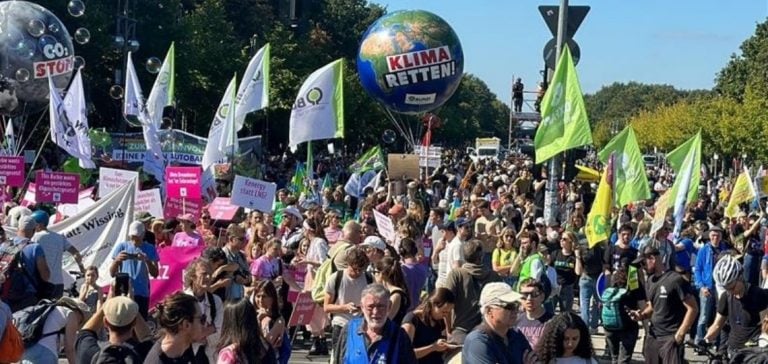On September 20, 2024, the Fridays for Future movement brought together around 75,000 demonstrators in Germany, a far cry from the record numbers of 2019.
The demonstrations, held in cities such as Berlin, Bonn and Munich, show a growing disinterest in climate issues, once at the heart of German society’s concerns.
Activists’ calls for an end to fossil fuel investments have failed to recreate the mobilization momentum of previous years.
This decline comes against a backdrop of retreating climate policies, despite the presence of green ministers in Olaf Scholz’s government.
Demonstrators, brandishing slogans such as “Save our future”, denounced a lack of political will to take action. move away from fossil fuels.
Focus on energy issues
Germany, a major consumer of coal and natural gas, is faced with major strategic choices in energy policy.
While the country is committed to reducing its CO₂ emissions, recent political decisions reveal a persistent dependence on fossil fuels.
Investments in green hydrogen and renewable energies are moving forward, but at a pace deemed insufficient by campaigners.
This situation is exacerbated by the Green Party’s disappointing results in recent regional and European elections.
The Greens, once the bearers of the climate agenda, are finding it hard to mobilize support, which complicates the implementation of ambitious decarbonization policies.
This lack of popular support makes radical change in the country’s energy landscape difficult.
Climatic consequences and social pressures
Recent events, such as the Boris storm that ravaged central Europe in September, echo experts’ concerns about the increase in extreme weather events caused by global warming.
Despite these warnings, German society seems to be moving away from mass climate mobilizations, perhaps because of immediate economic priorities.
Storm Boris caused extensive flooding, resulting in the deaths of 24 people.
Although these events should, in theory, reinforce calls for climate action, the public response remains muted.
Experts believe that this muted response could be explained by the lack of concrete results in climate negotiations and general fatigue in the face of the climate emergency.
Prospects for the German energy sector
Investments in hydrogen and renewables are at the heart of the political debate, but they are not enough to offset the continued use of coal and gas.
Olaf Scholz’s government, while under pressure to accelerate the energy transition, faces economic challenges, not least securing energy supplies in the short term.
Criticism of the slow pace of climate action in Germany is mounting, but the weight of fossil fuels in the national economy remains considerable.
Germany’s energy dependence on natural gas, particularly in winter, is holding back the country’s ambitions for a transition to greener energy.






















